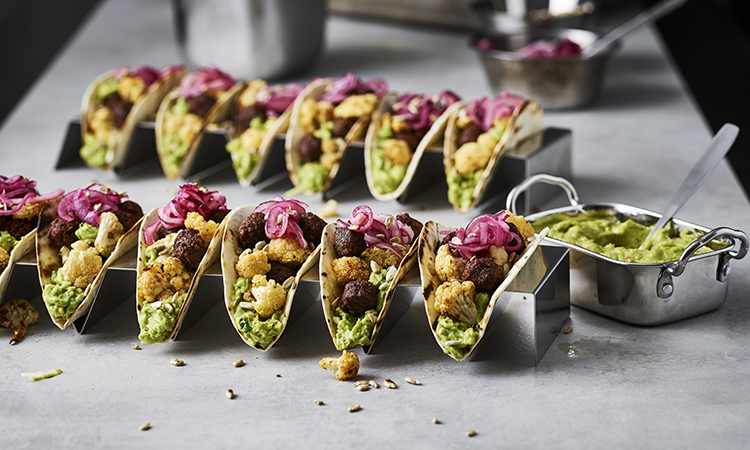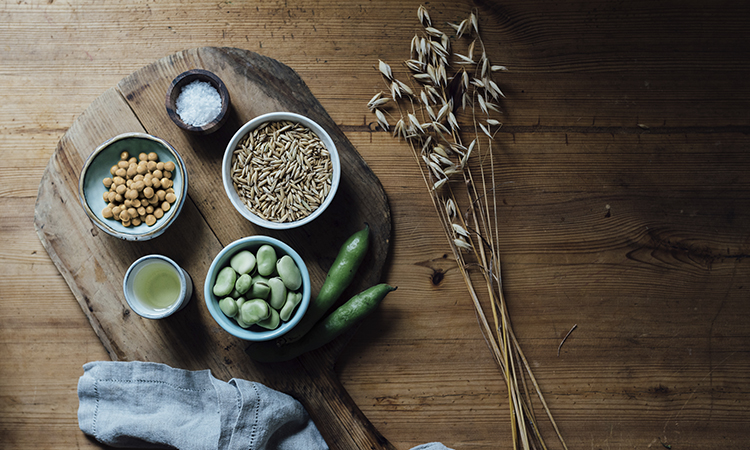What’s driving the plant-based boom?
- Like
- Digg
- Del
- Tumblr
- VKontakte
- Buffer
- Love This
- Odnoklassniki
- Meneame
- Blogger
- Amazon
- Yahoo Mail
- Gmail
- AOL
- Newsvine
- HackerNews
- Evernote
- MySpace
- Mail.ru
- Viadeo
- Line
- Comments
- Yummly
- SMS
- Viber
- Telegram
- Subscribe
- Skype
- Facebook Messenger
- Kakao
- LiveJournal
- Yammer
- Edgar
- Fintel
- Mix
- Instapaper
- Copy Link
Posted: 24 February 2021 | Simon Solway | No comments yet
With more consumers than ever choosing vegan cuisine, Simon Solway, UK and Ireland OOH and Retail Country Manager for Gold&Green Foods, looks at what’s driving the growing plant-based market.


Plant-based alternatives are available for so many different food types now
Plant-based food has taken the market by storm. In the last five years veganism has gone mainstream, with two percent of people actively describing themselves as vegan.1
2020 was the year everyone discovered plant-based, with new products appearing across the market, from bakery and pastries, to pizza, lattes, and even dirty burgers. The end of the year saw McDonald’s giving veganism perhaps the ultimate green flag with the launch of the McPlant menu. Analysts now predict the plant-based food market to grow by 11.9 percent by 2027 and have valued it at $74.2 billion.1
So what happened?
The COVID-19 pandemic had a huge impact and put what was already a buoyant market into overdrive.
At the start of 2018, Tesco rolled out its Wicked Kitchen vegan meals across 600 of its stores and sold more than 2.5 million units in the first 20-week period ending in May 2018 — more than double the company’s sales projections. Ocado and Waitrose also reported similar success with sales of their vegan and vegetarian categories booming, a clear indication of demand.
As a nation the UK started to introduce more vegetables into its diets and eat less meat. Google searches for ‘vegan’ rose by 700 percent in four years and campaigns, such as the Vegetarian Society’s Meat-Free Monday, also helped cement the idea of not eating meat every day. At the same time, the flexitarian diet grew in popularity, driven by health and environment influences; today, 60 percent of people consider themselves flexitarian.2,3
What’s driving the plant-based market?
Fast-forward to 2020, and a global crisis and two national lockdowns mean there is a refocusing of priorities. Health and wellbeing have become the core drivers, with many consumers reassessing what they eat and their impact on the planet.
By the summer of 2020, plant-based food sales more than doubled (+243 percent),4 with consumers putting 14 percent more meat-free and dairy-free options in their baskets. This hasn’t slowed down either and that’s partly thanks to the innovation now entering the food and beverage market both within manufacturing and foodservice. With so much choice, veganism has become even more accessible and appealing, helping to increase the appetite for plant-based even further. If researchers are right, there will be 12 million consumers eating meat-free and a 98 percent rise in vegans compared to this time last year.5
Caring about animal welfare
Although COVID-19 made health and wellbeing front of mind for many consumers, there’s been a number of other influences at play.
Animal welfare and the ethics surrounding eating meat have always been widely debated. An estimated eight billion animals are slaughtered each year, and animal agriculture is responsible for up to 91 percent of Amazon rainforest destruction.6 Mindful consumers are now aware of the negative effects animal-based diets are having on the world around them and the positive impact going vegan can have. In fact, nearly half (48 percent) of consumers reduced their meat consumption due to concerns over animal welfare.7


Associations between animal agriculture and deforestation has played a crucial part in driving the plant-based trend
The planet is another key factor: more than a third (37 percent)8 of people say sustainability is why they choose a plant-based diet. Compared to diets rich in animal products, plant-based is far more sustainable because it uses significantly fewer natural resources and puts far less pressure on the environment.
When you think that 30 percent of all greenhouse gases come from food production, and by changing one meal to Pulled Oats (our alternative to traditional mince) you’re saving seven full bathtubs (1,321 L) of water compared to a beef-based dish, the positive impact of plant-based diets is significant.9 This is something that is filtering through to consumers and influencing the choices they make when it comes to the food they eat.10
Convenience and money have also played a part. Quick and easy food is the order of the day, especially with consumers taking to the kitchen following hospitality closures; compared to meat, vegetable-based dishes are generally faster to cook. Today, more than a quarter of evening meals cooked are vegetarian or vegan.11
Research has shown that, typically, cutting meat from your diet can save a lot of money – over £600 a year.12 Last year saw millions of people furloughed or made redundant, so it’s easy to understand why so many have turned to plant-based eating in a bid to take better care of their health – personally and financially – as well as the planet.
So why aren’t consumers buying more?
Unsurprisingly, nutrition is a big influencer. Nearly a third of consumers (30 perecnt)13 feel current plant-based foods don’t give them all the nutrition they need. The protein trend continues to be a big consumer driver – influencing poultry sales – and so by reducing or cutting out meat, there is a very real demand (and gap) for a high-protein plant-based equivalent.
With protein comes the food holy grail of feeling fuller for longer. This can be a challenge for some plant-based pre-cooked products and something consumers won’t value when it comes to getting them to part with their money.
Clean ingredients and clear recipes are also essential. Forty percent14 of consumers are put off by ‘weird’ ingredients – ones they don’t understand or recognise. This is something that manufacturers will need to take onboard when innovating.
Research has shown that when it comes to ready meals, one in four consumers buy them once a month, and the barriers to buying more are that they feel they are over processed (56 percent), high in calories and salt (44 percent), low in nutrition (35 percent), and low in protein (23 percent). Basically, they’re hungry afterwards.
Finding that perfect trinity of nutrition, satisfaction and clean label really will make plant-based pre-cooked meals and products stand out from what is fast becoming a very overcrowded market.
What’s the next jackfruit?
Consumer expectation is high and what was considered acceptable a couple of years ago is no longer the case. Whatever you’re doing, taste and texture are crucial.15 Thirty-five percent of consumers look for innovation when making purchasing decisions, and the need for a valid substitute that gives good texture is high on their checklist.16
Mouthfeel is a high priority in food manufacturing, especially when it comes to meat alternatives. Consumers don’t want to feel like they’re missing out, but at the same time, ‘fake meat’ doesn’t always hit the mark, which is why oats are an ingredient to watch in 2021, thanks to their fibrous consistency.
Fuelled by the popularity of milk alternative, Oatly, the demand for oat-based products is growing. Tipped to be a hot trend this year, oats tick the boxes when it comes to texture, taste and protein.
Protein power is going to continue, with predictions that ingredients such as lentils, beans and chickpeas will all get more focus as we continue to move away from red meat and now poultry.
After a year like no other, food and beverages which are both functional and tasty will also grow in popularity; consumers are looking for simple steps to support their health and wellbeing, so foods that can do just this will prove popular whether it’s added vitamins, fibre or protein.


Could oats be the next big ingredient?
How do you satisfy the consumer appetite for plant-based?
The key word here is innovation. Consumers are getting more adventurous and more curious about plant-based; by doing differently you can set yourself apart from the competition. Innovation can come from a variety of places, from new-to-market ingredients or even the cuisines that are influencing consumers.
Our research shows that consumers are looking for far more plant-based options, ranging from pies and pastries (50 percent), to curries (43 percent) and pizza (45 percent), which all lend themselves to a world of exciting flavours. When you think the top selling ready meals are Indian (17.2 percent) and Chinese (9 percent) and newcomer Mexican has seen a growth of 19.6 percent, there is a huge opportunity for plant-based to get in on the action and flavour.17
Health will continue to dominate our lives and the importance of caring for our planet has never been more apparent. With all these influences, plant-based has a real opportunity to grow.
References
- Vegan Society
- https://www.globenewswire.com/news-release/2020/08/13/2077824/0/en/Plant-based-Food-Market-Worth-74-2-Billion-by-2027-Growing-at-a-CAGR-of-11-9-from-2020-Pre-and-Post-COVID-19-Market-Opportunity-Analysis-and-Industry-Forecasts-by-Meticulous-Resear.html
- Vegan Society
- The Guardian ‘What we eat matters’ https://www.theguardian.com/commentisfree/2019/oct/08/climate-change-food-global-heating-livestock
- NPD 2020
- Finder https://www.finder.com/uk/uk-diet-trends?_ga=2.159763325.1980977180.1566535152-2100258465.1565068082
- Vegan Society
- Future Thinking 2019
- Future Thinking 2019
- Aalto University’s study
- The Guardian ‘What we eat matters’ https://www.theguardian.com/commentisfree/2019/oct/08/climate-change-food-global-heating-livestock
- https://www.bbc.co.uk/news/uk-42973870
- https://plantbasednews.org/opinion/meat-free-diet-cheaper-ps600-year/
- Gold&Green Foods/Toluna 500 consumers September 2020
- Gold&Green Foods/Toluna 500 consumers September 2020
- https://tastingthefuture.com/2020/11/04/6-plant-based-food-and-beverage-trends-for-2021/)
- Gold&Green Foods/Toluna 500 consumers September 2020
- kantar 52 we September 2019
About the author
Simon Solway has worked in food and drink manufacturing for over 30 years. Working previously for both Tesco and global manufacturer Döhler, Simon was drawn to Pulled Oats by Gold&Green Foods by its innovation, sustainability and purity.
Related topics
Clean Label, COVID-19, Environment, Flavours & colours, Free From, Health & Nutrition, New product development (NPD), Plant based, retail, Supermarket, Sustainability, The consumer







